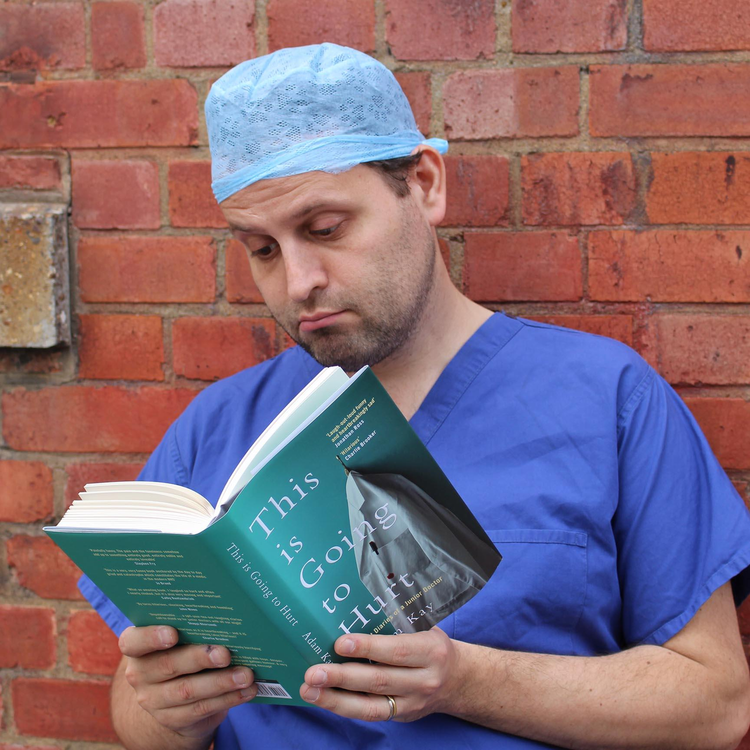Share

Eat Sleep Work Repeat - better workplace culture
Adam Kay - This is Going To Hurt
We’re talking work culture in different ways for the next few episodes. The next two episodes after this are in the police force. But today’s guest is the best selling author of the year - Adam Kay. This is Going to Hurt : Secret Diaries of a Junior Doctor has sold over a million copies. It’s also won the readers’ choice book of the year this year. So there’s a chance you’ve read it and if so you will love the discussion with Adam Kay because he takes us into the working environment in hospitals. If you’ve not read it I could not recommend this beautiful, funny, principled book more.
Adam explains in the book that the title Junior Doctor is a touch misleading - everyone who isn’t a consultant is titled a junior doctor. He is successful comedy writer who wrote the book 7 years after leaving the health service after a terrible terrible day at work. He wrote it because he found underpaid overworked health workers being politicised by the vampires who run government. Specifically the multi-millionaire former health secretary who claimed that in some way that doctors were greedy. The book is the funniest thing you’ll read this year and we covered that but we also talked through the working culture in hospitals.
US listeners will know that the issue of single payer health care is a hot topic in the US - in the UK we have the NHS and it’s worth saying as Adam says it is a source of national pride. We just need to fund it properly.
I hope you enjoy this as much as I did. I joined Adam for a chat at restaurant in West London.
Sign up to the Make Work Better newsletter or check out the best ever episodes at the website.
Eat Sleep Work Repeat is made and hosted by Bruce Daisley.
More episodes
View all episodes

221. People-watching in the workplace
42:32||Season 12, Ep. 221Dr Karen Bridbord is the author of a new book, The Relationship-Driven Leader that invites us to bring a psychologist's lens to our job and the relationships with those around us.Her perspective is to use psychology to understand the person in front of you to interpret the world through their eyes. If you’ve got a controlling boss or someone who behaves in a way that impacts your life she helps you unpick what’s going in their head. The Relationship-Driven Leader: Strengthening Connections to Enhance Productivity and Wellness at Work
220. What Gen Z need from work
38:38||Season 12, Ep. 220Gen Z have been shaped by recessions, the pandemic, geopolitical instability, not to mention financial insecurity and world changing technology.That's the finding of the Edelman Gen Z Lab as told to me by the leader of the project Jackie Cooper. Most powerfully she explains that Gen Z's have a 'visceral need for safety' - that's financial, social, cultural and even physical.They respond to fear by asking questions and wanting to be heard, which older generations often misread as entitlement or disrespect for hierarchy.Politically, Gen Z is fragmented. Younger Gen Zs, especially boys/young men, are leaning more conservative and drawn to strong-man archetypes; older Gen Zs, shaped by Obama / BLM, are more idealistic about progressive politics. Algorithms and “TikTok-isation” amplify those splits.I was blown away to see Jackie Cooper from Edelman talk about the research that the company has done to understand the new generation of workers entering the workplace - I think you'll love this discussion. You can read the report hereFull transcript on the website.
219. Is training really corporate sludge?
42:21||Season 12, Ep. 219Most company training is a waste of time that turns firms into bureaucratic sludge holes. That’s roughly the conclusion of today’s episode which is a conversation with Andre Spicer and Mats AlvessonThey have a new book out The Art of Less. Andre has been a guest a few times before - way back in 2018. This podcast is old. In 2018 this podcast was ahead of Steven Bartlett’s Diary of a CEO at the top of the podcast charts. (Andre talking about open plan offices)The idea that much of what companies do is related to their self identity, what the company aspires to be in the world - with the end result that it doesn’t achieve these things.Things we discuss:'The Death of the Corporate Job'how 'initiative-itis' is dragging down organisationshow training is corporate sludge that doesn't achieve its goalscorporate culture as an act of 'grandiosity'
218. Strong team identity delivers success
45:24||Season 12, Ep. 218Jeremy Holt is a psychologist and leadership coach who has spent more than 20 years helping teams get better. Read his research about better team results.This episode is the third part of a series about the power of identity in teams. Listen to the other Eat Sleep Work Repeat episodes about identity.Jeremy posting about identityWatch the Lebron documentary More Than a GameJeremy's book For the Love of the Game
217. To understand leadership, you need to understand identity
51:51||Season 12, Ep. 217This is the second part of an interview with Professor Alex Haslam, the world's leading voice on the study of social identity.You can hear the first part of this interview on the website.In this discussion we talk how social identity can help us understand leadership.Alex talks about the CARE model of leadership.C - Create the groupA - Advance the group (sometimes over themselves)R - Represent the groupE - Embed the group identity in everyday life for the groupIf you're interested in exploring Alex's recent contributions to discussions on leadership and culture these papers are a great place to start:Zombie LeadershipHuman Me-sources or Human We-sources - exploring leader narcissismAlex Haslam is Professor of Social and Organisational Psychology at the University of Queensland. He is one of the world’s leading researchers on group dynamics, leadership, and identity. Over the past three decades, Alex has helped reshape our understanding of how people think, feel, and behave as members of groups, and why social identity is central to motivation, resilience, and effective teamwork.
216. Everything is identity
43:03||Season 12, Ep. 216“Why are we so fixated on the individual self? I think it was a big con. The individual self is a relatively modern invention. The idea that human psychology is about the individual self was really an analytical fiction that was devised in the 20th century.”This is the first part of a wide-ranging discussion with Professor Alex Haslam. He talks us why our group identities are so essential to us and define who we are as adults. He quotes his mentor John Turner who said, 'Social identity is what makes group behaviour possible'. By the time you've finished with this episode I'm sure you'll agree.Check out an utterly brilliant talk by Alex - consider this the best training you could send yourself on.Alex mentions his partner Cath Haslam, who is also a psychologist.Full transcript and notes are on the website - along with an Identity playlist of episodes. Alex Haslam is Professor of Social and Organisational Psychology at the University of Queensland. He is one of the world’s leading researchers on group dynamics, leadership, and identity. Over the past three decades, Alex has helped reshape our understanding of how people think, feel, and behave as members of groups, and why social identity is central to motivation, resilience, and effective teamwork.Alex is co-author of The New Psychology of Leadership and The New Psychology of Sport and Exercise, and his work has been applied widely—from health and education to business, politics, and the military. With over 300 research articles and multiple international awards to his name, Alex is recognised as a pioneer of social identity theory in practice, showing how a sense of “us” can unlock extraordinary human potential.
215. We need to tackle workplace loneliness
46:28||Season 12, Ep. 215Simon Gilbody talks loneliness at workThe Loneliness of the American Worker - Wall Street JournalMake Work Better on lonelinessMore on solving lonelinessLoneliness in teamsDerek Thompson on elective isolationProfessor Simon Gilbody is a psychiatrist and clinical epidemiologist at the University of York. His work specialises in 'taking a population approach to mental health', trying to understand the aspects of modern life that contribute to how we feel.I was impressed by a talk that Simon did with the Financial Times on the topic of workplace loneliness.In our discussion Simon reflects on the toll of loneliness, how workplace loneliness can leave us with invasive thoughts, and what to do about it.Some links we discuss:Dr Lucy Foulkes - I really enjoy her TikToks, I think I gave a shout out to her book on adolescents a few weeks ago.Red Cross Report on LonelinessThank you to Mary Howarth at University of York for helping to arrange the discussion.Transcript on the website
214. Delivering culture through food
34:49||Season 12, Ep. 214This sponsored episode is brought to you by Deliveroo for WorkSpencer Walker is the global director of Deliveroo for Work.The podcast has returned several times to the idea of food as a cultural trigger, something that catalyses connection and allows cohesion. We explore that idea further this week with Spencer Walker who runs Deliveroo For Work the workplace service provided by the delivery firm. The Deliveroo Feeding Employee Engagement ReportI mention a book by Robin Dunbar and Samantha Rockey, it's this: The Social Brain - Tracey Camilleri, Samantha Rockey, Robin Dunbar. They talk about giving curry to bond teams (because the sharing plates require people to pass them around). Hear them talking about it here.Deliveroo for WorkThe Deliveroo Feeding Employee Engagement ReportMore about food, rituals and culture
213. RTO mandates are caused by middle aged men not liking their wives
22:58||Season 12, Ep. 213Delighted to post this small conversation with Nick Shackleton-Jones. Nick posts brilliantly witty rants on TikTok that are just the best things I hear about work and the futility of bureaucracy.TikTok is a fame machine and if creators drop a banger they can end up reaching a vast audience. Nick has posted some content about work, neurodiversity and philosophy that has had millions of views.It was his take on why middle aged men wanted to return to the office that I put in the newsletter last week and made up the reason why we chatted but there’s so much more to this - not least him talking about adaptive behaviours and masking for people on the spectrum.Great listen. If you don’t use TikTok then I’ve given a selection of his best posts below:Nick on LinkedInShackleton ConsultingNick on TikTok - this is the good stuffBest posts to check out:Middle aged men don't get on with their wivesThe original on middle aged menWhat I miss about corporateMore of what he misses about corporate (on company values)Adaptive processes for neutrodivergent peoplePedestrian bellChase differenceGet the newsletter here